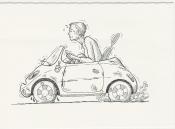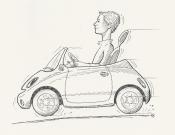
It's a bit like driving a car. If you drive it into the ground with high revs, excessive braking, in a stressed and tight manner and don't look after it or service it, it will give you poor performance, it will be unreliable and forever into the garage for repair work and it will not last long.  If, on the other hand, you learn to drive it smoothly and efficiently, in a relaxed and alert manner and you look after it and service it, it will give you little trouble, will be a pleasure to drive and will last you a long time. Alexander's phrase for this concept was 'Use Affects Function', ie how we 'use' our body in everyday life affects how it functions now and for the rest of our life. Thankfully, with his Technique we can change how we 'use' our body for the better in the short-term and therefore in the long-term. Car drawings by R Armstrong |
What is the Alexander Technique?Alexander Technique looks at the root cause or contributory cause of many back, neck, joint or stress problems, ie the unconscious habitual 'misuse' of the body in our everyday life, which unfortunately is part of our Western culture. Over months and years this 'misuse' sets up and embeds in our musculo-skeletal structure stresses and strains which may eventually lead to a bad back, neck or joint and/or mental or emotional stress. Once this happens, the likelihood is that the body will become ever weaker and more prone to damage. With the help of an Alexander Technique teacher, this bleak state of affairs can be reversed and the pupil/student can both 'unlearn' the habitual misuse and 're-learn' the original balanced and effortless good use of the body with which we were all born (we can see this 'birthright' of poise and mobility in any young child). This reversal is achieved in accordance with individual needs via the teacher's verbal and 'hands-on' guidance and by the student's active participation in the learning process. Thus the techniques can gradually become 'second nature' and can therefore be carried into the normal working and playing day for the rest of the student's life. It is of course always up to the individual student, but generally the body can become gradually stronger again and more resistant to strain. As freer mobility and balance usually return, so improved performance of any task is a natural consequence. At the same time, mental alertness and a greater sense of wellbeing can be a pleasant bonus. Is it effective?BRITISH MEDICAL JOURNAL REPORT ON BACK-PAIN TREATMENTS AUGUST 2008 Recent clinical trials by Portsmouth and Bristol Universities looked at the effectiveness of the Alexander Technique and were published in the British Medical Journal(BMJ 2008;337:a884). The research covered 579 patients with chronic or recurrent low back pain in England, and looked into the comparative long-term effectiveness of a number of back-pain treatments over a timespan of 12 months. Treatments tested were:
According to
the results published in the BMJ and widely reported in the news, the group who had undertaken Alexander Technique sessions was by far the most successful group in
terms of eliminating/extensively reducing their back pain and had by
far the the best record for KEEPING the pain at bay once sessions had
finished. They concluded: For more information and comments about Gail's teaching, please go to the comprehensive 'People's Stories page' page.
|


Gail Barlow is the Director of Dolphin Alexander Courses, which she set up in 1990 after completing the three-year full-time Alexander Technique Teacher Training Course and qualifying as a Teacher of the F M Alexander Technique.
Gail trained as an Alexander Teacher in the eighties and has now worked with over 2,000 people in the UK and Europe. She is now a very experienced teacher and is able to 'tune in' and work with each person in a method and at a pace uniquely suited to their individual needs.
She is a Member of the Society of Teachers of the Alexander Technique (STAT), which was founded in 1958 and is the oldest and largest professional body of Alexander Technique teachers in the world.
Data protection and privacy
Any contact and other personal details that you provide to Gail will only be used to communicate with you regarding your appointments and to provide necessary information regarding your Alexander Technique course. Any information held will be deleted 12 months after you cease to be a student. Personal information regarding students will be kept strictly confidential.